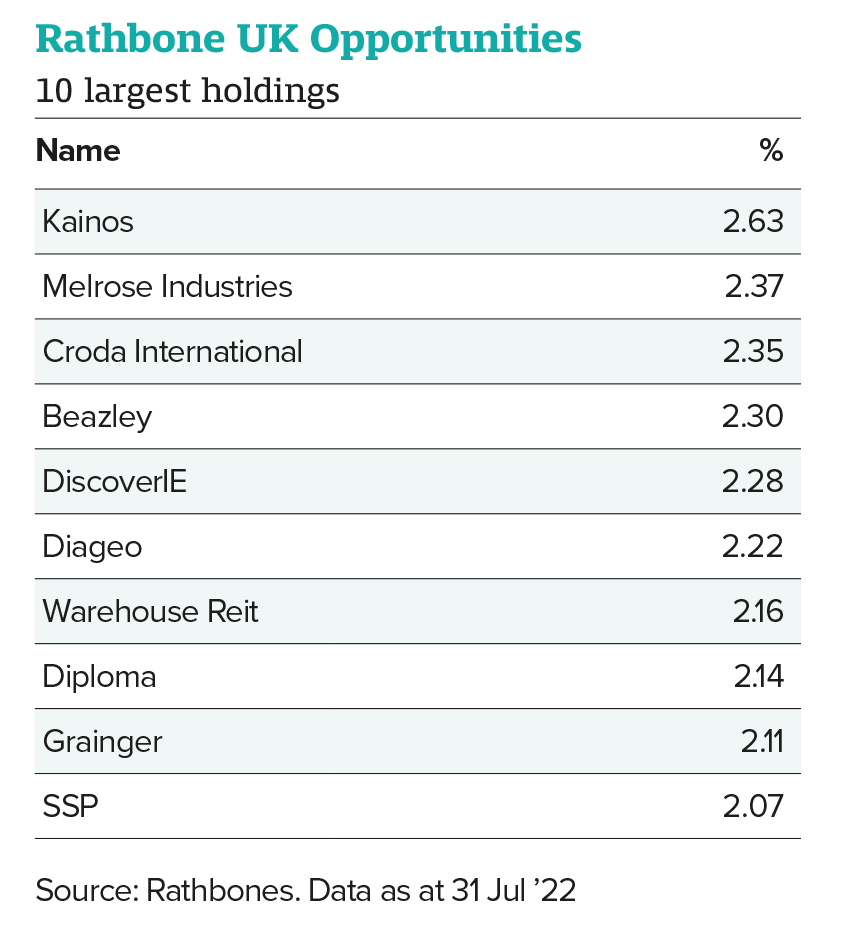It has not been an easy time to be an investor in UK markets. A buyer’s strike from international asset allocators, chaotic politics and a weakened economy have left UK assets at bargain prices, but without a catalyst for change.
Nevertheless, Alexandra Jackson, manager of the Rathbone UK Opportunities Fund, has not regretted her choice to specialise in the UK market.
“At Rathbones, they want you to find your natural home and for managers to run money the way it suits them,” she says. “Over time, I realised UK mid cap was where my heart was.”
Neither is she nearly as gloomy about the prospects for the UK as some of the more apocalyptic commentators.
“When I look at the infrastructure of the UK economy, it seems pretty resilient. There has been a certain amount of fixing the roof as the sun has been shining and the system looks a lot more secure than it did in the crisis of 2008/09.
“Private debt levels are much lower. Households have excess savings equivalent to around 11% of GDP. Banks are capitalised four times higher than they were. Public sector debt maturity is the longest in the developed world. In 2008/09, financial fragility magnified the losses, but that is unlikely to happen this time round.”
Resilience in reserve
Jackson points out that the corporate sector had to repair its over-leveraged balance sheets after the last crisis, which constrained the recovery. This time round, they have greater resilience.
“UK companies have so much excess cash, giving more flex and strength in the system. We’ve got this thick layer of uncertainty, thanks to politics, energy prices, labour availability. There are a lot of shadows to chase. The risk is you spend so much time chasing these shadows, working out what happens when the recession hits, tracking every basis point move in jobless claims and inflation data, that you talk yourself out of picking stocks.”
Nevertheless, she is clear this is not a time to be looking at lower-quality stocks in the hope of a cyclical recovery. From colleagues such as Hugh Yarrow, James Thomson and Carl Stick, she learned that buying the highest-quality companies at knock-down prices is the best response to difficult market conditions.
“When times are tough, the quality growth end is where you want to be. These companies have their own internal drivers, with structural growth. The ones with that strong moat can do well through market cycles. We’re talking about inventory with companies a lot at the moment. To satisfy customer demand, they’ve taken more inventory on their own balance sheet.
“That’s great, but you can only do it if you’ve got the cash. It reminds me why it’s important to have high-quality companies.”
The importance of process
Jackson has built the process on the UK Opportunities Fund organically, cherry-picking from her training with other Rathbone managers. She joined 16 years ago, and the Rathbones training saw her work in all parts of the business.
“As trainees, we spent a few months rotating with each of the different managers. We did company analysis and went to meetings from the start. I spent time with Marina Bond, for example, who ran the smaller companies fund, and she taught me working capital is key to smaller companies’ durability. She was forensic in analysing working capital.
“Carl Stick led the way on assessing areas such as governance and culture. Hugh Yarrow – now at Evenlode – showed me why, at times of market stress, you buy the highest-quality companies you can afford.”
She also worked alongside Thomson on the Global Opportunities Fund, who she says “has a great nose for finding durable growth companies”.
Having decided UK mid- and small-cap growth companies were the part of the market that interested her most, Jackson added her own elements to the process – accounting, for example.
“If a company is generating enough cash through its own operations, they don’t need to engage in trickery to flatter their earnings and make things look better than they are. When you see this type of jiggery pokery, it’s a good signal all isn’t well. Accounting conservatism is the first thing that goes when times get tough.”
The new analyst on the fund, Robbie Carr, has focused on non-audit fees paid to the audit company. This highlights where an audit firm is getting chunky management consultancy fees from a company and whether this skews the incentives. It may seem niche, but it has helped them avoid some problem areas.
She adds: “The process is organic. It reflects the quirks of the market, and it can develop over time.”
Jackson says the process has been as important for the areas it helps them avoid as where it leads.
“It has kept us out of some poor-performing UK IPOs this year, particularly some of the consumer-facing ones. This comes back to our accounting discipline. Some of the worst offenders had significant accounting red flags.”
A piece of the action
Kainos is an example of the type of stock Jackson likes. She bought the software company when it was a small cap, it has high margins, plus a high and stable return on invested capital. This gives it a sustainable moat and helps ensure the long-term durability of cashflows.

Jackson says: “The management team sets a good culture from the top – humble, sensible, with a tendency to underplay and over-deliver. That suggested to us that the premium valuation was worth paying.”
The share price has moved a little lower this year amid the general unpopularity with technology stocks.
“We felt the economic moat had strengthened if anything and we picked up a little more.”
Elsewhere in the portfolio there is “sensible tech – no-debt, high-margin businesses”.
She also holds non-bank financials such as insurance, which have some interest rate sensitivity but are not cyclically exposed. She is avoiding banks, which have historically done well in a rising-rate environment, “but the shape of the yield curve and worries about recession mean we really don’t want to own banks now”.
She also owns some specialist asset managers that have been sold down, plus selected, non-cyclical industrials where the valuations have moved lower, including life sciences and clean technology.
Jackson believes, with a three- to five-year horizon, it may look like a good moment to pick up UK mid-caps.
“To the end of July, the FTSE 100 has outperformed the Mid Cap Index by over 15%. The magnitude of that divergence is rare. In the last two decades, mid caps have outperformed large caps: they tend to be higher margin and with lower debt.
“More recently, the FTSE 100 outperformance has been driven by energy, but in mid caps everything has underperformed. If, like us, you own a bunch of mid caps and no energy, the year has been painful.
“We normally have to pay a premium for high-growth, high-margin mid caps. This level of outperformance by the FTSE 100 means that premium has evaporated, so I can see a nice set-up for mid-caps from here. History tells us, in a recovery, mid caps and stocks tend to bounce harder and faster. We’re not there yet, but over three to five years, this may look like a great opportunity.”
The fund is currently £55m in size. Jackson says that up to £350m they wouldn’t need to change the process or the holdings, but they would assess again if it reached that level. That said, the process has been designed to work for large caps as well as smaller companies.
“The universe is very big and, aside from this year, there is this renewal through IPOs and M&A. We’ve tried to make the process repeatable.”
Jackson says the level of bearishness towards the UK market is such that small changes could make a significant difference to market pricing. If consumer sentiment picked up, for example, or there was better news from Ukraine, it could be a catalyst for a re-rating of sterling and of the broader mid-cap sector. The FTSE All-Share is still at a significant discount to the S&P 500, giving investors a meaningful cushion.
In the meantime, she retains her faith in UK plc. “When I get bearish, I go back to the companies – that’s where the optimism comes from. They’re finding ways to make money, things to buy. British business is incredibly adaptable and able to zoom round these issues. That gives us optimism that there’s money to be made.”
BIOGRAPHY
Alexandra Jackson is manager of the Rathbone UK Opportunities Fund. Previously, she was co-manager of the Rathbone Recovery Fund, appointed in June 2014, and has spent nearly 15 years with Rathbones. She joined Rathbone Unit Trust Management in 2007 as an equity analyst, and then became assistant fund manager on the Rathbone Global Opportunities Fund.
This article first appeared in the September edition of Portfolio Adviser Magazine







